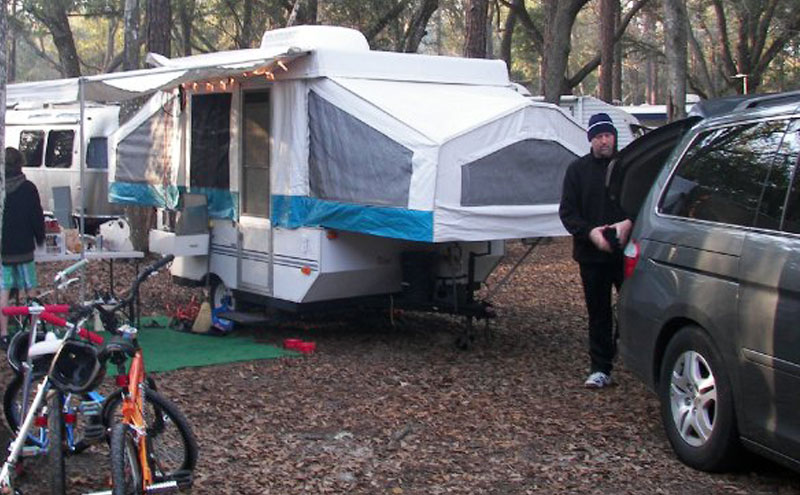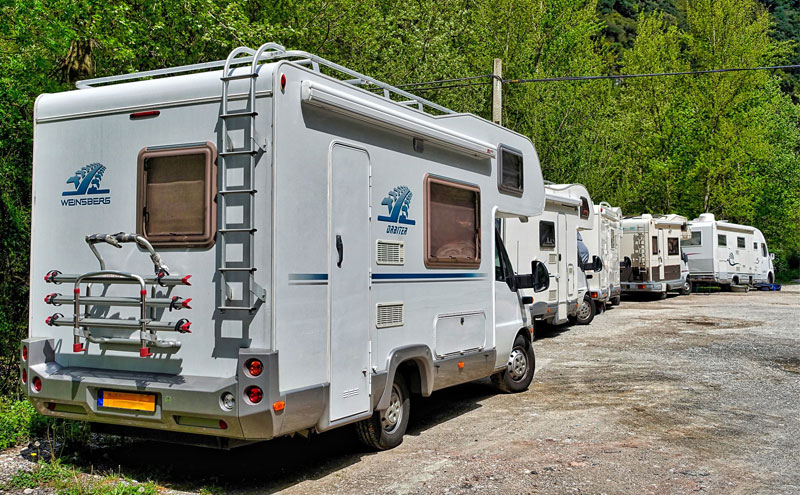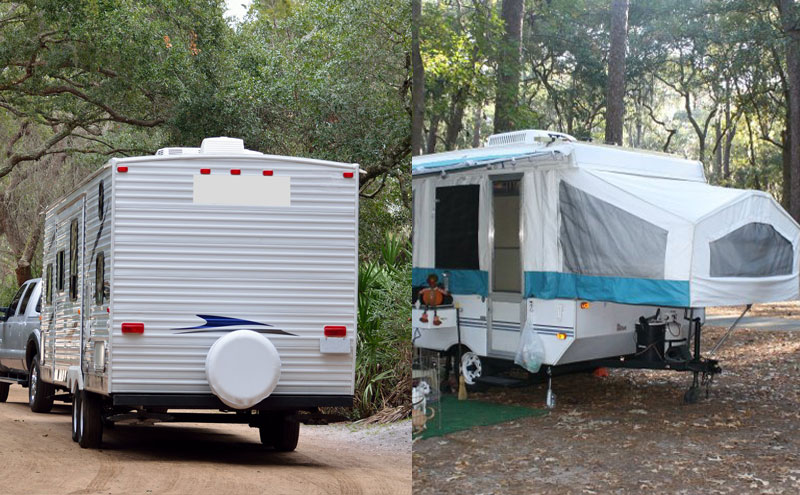I remember back when I was a teenager and my parents faced the tough choice between a standard travel trailer or a tent trailer. I traveled to every single place with them, learning all about the decision making process. We also considered some hard side travel trailers with canvas pop outs, also known as hybrid trailers.
For most, I would recommend a pop-up tent trailer as it's much less difficult to store and easier to tow. If you need something larger, would like a shower and bathroom, or have a larger budget, then a travel trailer is a good option as well.
We decided to go for a pop-up tent trailer, so I figured I'd share some of the pros and cons of each option we went through to pick the best camper for our family.
Tent trailers feel more like camping
A common negative to traditional travel trailers is that they can feel like you're in a house or apartment, and not in nature enjoying the beautiful weather.
Due to the construction of a travel trailer, you're limited to how many windows you can open to create a cross breeze. Whereas with a tent trailer, you can open all the canvas and let tons of fresh air inside.
However, you could also go for a hybrid trailer with canvas sides if this is something you wish to do. Many times I'd find myself going outside and riding my bike to enjoy the weather. This is really only an issue when doing activities inside the camper. Not to mention, a pop-up camper will feel more cozy inside due to it's compact design.
Tent trailers are much easier to store
The neighborhood we lived in, like many places, did not allow for trailers to be stored on property behind the side fence. Therefore, your only option is to pay for trailer storage when you're not using it.
With a tent trailer however, it's got such a low clearance that it can fit low under the fence to where the HOA would never find out. We were even able to fit and store our pop-up inside the garage to keep it sheltered from weather. This also saves time from having to drive to a storage facility for pick up.
Travel trailers are much more waterproof
When camping inside a conventional travel trailer, it's like staying in a small hotel. This home on wheels protects you from all the rain and weather, and you'll stay quite dry.
A well kept tent trailer will also keep you dry, yet the canvas walls do tend to condensate the water from outside. This causes corner areas around the bed frames to get wet if they touch the walls. It's not a huge issue, yet this does mean that you'll have to air out your camper to dry before closing it back up when you get home.
Tent trailers weigh much less
A tent trailer can weigh about 2,500 pounds where a similar travel trailer may weigh up to 4,500 pounds. We were actually able to tow our Rockwood Freedom with a van!

The van we towed it with was a 2007 Honda Odyssey for those wondering. If you don't have a truck to tow a heavy camper, this is a great option. That's my dad opening the hatch to the right. Which leads to my next point, if you plan to use a van you'll have all that extra covered rear storage right in your vehicle.
The main reason why tent trailers weigh much less is due to their canvas sides. They also don't have as many wood cupboards or amenities that add to the weight.
Being able to tow our camper with a van also allowed us to drive more people when going on outdoor excursions. Our family friends in many cases would ride with us since they were limited to driving trucks with their travel trailers. This also made longer road trips to different states a whole lot more comfortable.
Tent trailers are easier to back up
One of the most frustrating parts of camping is to get your trailer to back up "just right" to fit into the campsite. With a pop-up camper, your job is much easier. You won't be moving as large of a trailer so it's got less room that it takes up on the site. That means less trees and other objects to worry about when backing up.
In addition, when you're towing a tent trailer you can typically see right over it. The only time you can't is when the ac unit is in the way (which doesn't happen too often).
Some people also install an RV back up camera or their travel trailer comes with one. This does help for larger trailers and campers, yet it's no silver bullet. You'll still have a tougher time in most cases if you have a larger camper.
Travel trailers are more convenient to pack/unpack
A major benefit to a travel trailer is that you can leave a lot of your camping supplies inside the camper. This makes packing and unpacking a whole lot easier since you already have most of your stuff ready to go once you park on the campsite.
With a pop-up camper, we'd spend several hours preparing our camping checklist and making sure we had everything packed perfect. Then once we got back home it would take a couple hours to clean out the van.
Traditional trailers have a lot more storage inside than a tent trailer. Not to mention, once you're at the campground you park it and unload right away since you don't have to pop it up. This makes going for a quick weekend trip a lot more feasible, with less preparation required in advance.
This is really the #1 drawback to owning a tent trailer for my family.
Tent trailers are a lot cheaper
The cost of a tent trailer will be at least $10,000 cheaper than a travel trailer when new. That's a large difference in the amount of money, so you'll have to make sure that a travel trailer is really worth it for you. We were able to get our pop-up camper used for a really good deal on Craigslist.
In addition, tent trailers will be less expensive to insure since they have less parts that can break. They also save money in fuel since they weigh much less and are more aerodynamic on the highway.
Few pop-ups have a bathroom or shower
This one is actually both a pro and con at the same time. Some pop-ups will have a bathroom or shower, typically only behind a curtain. It's not really too fun having little to no privacy when going to the bathroom. Or if you don't have one, this means you'll have to walk over to the campground bathroom when you gotta go.
It's usually not too bad to go to the campground bathrooms as long as you're in a state or national park (they're usually cleaner). We would try to grab spots somewhat close to the bathroom to make it less of a walk.
The major upside to not having a bathroom is no dump station lines!

Being able to skip and avoid these long lines of RVs and trailers will save you a lot of time and headaches when leaving your campsite. These lines can sometimes last for over an hour if it's a holiday weekend and everyone is leaving at the same time.
Of course you could also opt for a portable travel toilet to setup inside your camper for when you really gotta go.
We had a great experience using this Camco Standard Portable Travel Toilet.
Be sure to grab the holding tank deodorizer, as these toilets do get smelly if the tank is left open. You'll also want to get special toilet tissue as regular toilet paper will clog it up.
To dump these travel toilets all you have to do is detach the tank a pour the sewage into a regular toilet. We would usually avoid number two (other than emergencies) and keep it to only number one inside the tank to make it easier for dumping and cleaning.
If you're camping with girls, having a portable toilet will also be very useful as they can't really pee in a bottle like boys.
Travel trailers have more space (in general)
This is not always the case depending on the trailer. I've been in quite a few tent trailers that are very spacious, yet in general travel trailers have more space. You also have more room for movie nights and having other people stay over.
When preparing meals with a family of four it was somewhat challenging and cramped at times inside the pop-up camper. Many times we would eat outside to enjoy the weather, so this was really only a problem when there was bad weather.
Traditional trailers provide more insulation
The hard walls of a travel trailer offer more privacy and insulation inside. Now a tent trailer does keep in cool air and heat decent, yet not as much in comparison. When it got really cold or hot inside, it does not maintain the temperature as well as travel trailer counterparts.
Using a tent trailer is still much better than a traditional tent since you're off the ground. However, many times I'd still find myself curled up inside a sleeping bag despite being on a pop out bed.
Longer setup time on a pop-up
This has got to be the worst part of a pop-up camper is the setup time. When you get to a campground with a travel trailer you park and you're done. With a tent trailer, you've got to crank up the top (if it's not electric), pull out the beds and support them, and setup the kitchen.
This aspect also adds the most time to unloading and loading your pop-up camper. The added stress of reaching a certain check out time can be frustrating with the extra campsite procedures. This means you'll have to start packing up to leave a lot sooner than other campers.
Travel trailers offer better security
When you go hiking or biking on trails and leave your campsite you'll lock up the door. The hard sides of a travel trailer prevent anyone (or animals) from getting inside when you're not there. Not to mention if you're traveling with someone who doesn't love camping, this will make them feel a lot safer.
With a tent trailer the lock on the door is there more to deter potential intruders. If someone wanted to get inside they could just lift the Velcro canvas on the camper. Then, unlock the door from the outside by reaching inside.
Most campground are filled with families and pretty safe, so this isn't something you'd really have to worry about. If you have any valuables you could also choose to lock them inside your vehicle.
Pets work better in a travel trailer
When going on camping trips we would always bring our two dogs Draco and Daisy.

The only downside to having pets in a tent trailer is that if you leave them at the campsite and they bark, everyone nearby could hear them. This can be annoying to fellow campers and can even get you kicked out of the park. Many campgrounds do not allow unattended pets in pop-ups also for the fear that they could get out.
With a travel trailer, the walls are much more soundproof (and hard) which makes it easier to leave your dogs at the campsite. If your dogs are small and quiet (like ours most of the time) it wasn't usually an issue. Regardless you'll want to at least check the camping restrictions if you have pets.
To Conclude
Choosing between a travel trailer vs tent trailer can be a tough decision. You will have to decide what will work better for your family. For us, it was better to choose a pop-up camper for easier storage, saving money, and being able to tow it with our van.


